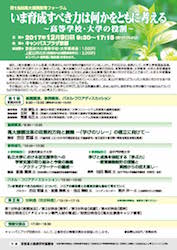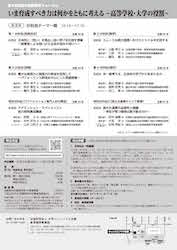Business overview
The forum is being held with the aim of “sharing information on domestic trends and disseminating information on efforts being made in Kyoto” regarding issues of collaboration and connectivity in education between high schools and universities.
Event Outline
The 15th High School-University Collaboration Education Forum
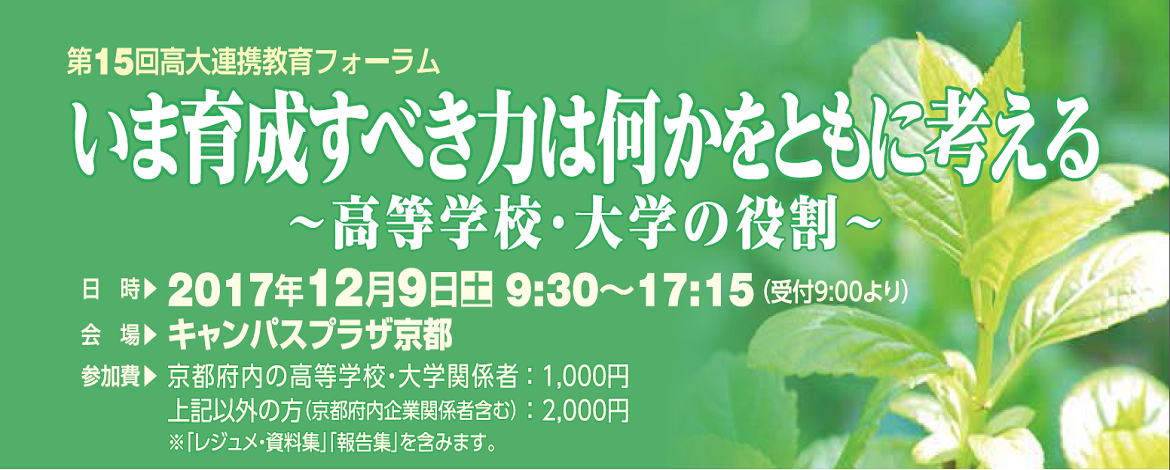
※We have increased the capacity of some of our positions.
| schedule | Saturday, December 9, 2017 | ||
| venue | Campus Plaza Kyoto | ||
| theme | Thinking together about what skills we should develop now: The role of high schools and universities | ||
| Capacity | Part 1 | Keynote speech, case study report, panel and floor discussion | 230 people (first come first served) |
| Part 2 | Expression techniques, mathematics, English, science | 30 people each (first come first served) | |
| Special Session 1: “Developing admissions professionals” | 50 people (first come first served) | ||
| Special Session 2: “High School-University-Social Collaborative Career Education” | 60 people (first come first served) | ||
| Information exchange meeting | 60 people (first come first served) | ||
| Participation fee |
Part 1 and Part 2 | High school and university personnel in Kyoto Prefecture Anyone other than the above (including corporate participants in Kyoto Prefecture) *This includes “resumes/collection of materials” and “collection of reports.” |
1,000 yen 2,000 yen |
| Information exchange meeting | If you wish to participate in the information exchange session to be held at Campus Plaza Kyoto Hall, please pay the amount shown on the right in advance. | 3,000 yen | |
| Sponsored by | Kyoto High School-University Collaborative Research Council (Kyoto Prefectural Board of Education/Kyoto City Board of Education/Kyoto Prefectural Association of Private Junior and Senior High Schools/Kyoto Chamber of Commerce and Industry/University Consortium Kyoto, a public interest incorporated foundation) | ||
The flyer for the 15th High School-University Collaboration Education Forum can be downloaded here.
[Part 1] 9:30-15:00 Keynote speech, case studies, panel discussion
MC:
Toshihiro Onishi (Associate Professor, Faculty of Science and Technology, Ryukoku University / University Consortium Kyoto High School-University Collaboration Promotion Office)
Opening remarks:
Satoshi Kitamura (Principal, Kyoto Gaidai Nishi High School / Chairperson, Kyoto High School-University Collaboration Research Council Steering Committee)
Purpose explanation:
Katsumi Arase (Professor, Faculty of Letters, Otani University / Director, University Consortium Kyoto High School-University Collaboration Promotion Office)
| Keynote speech 9:35-10:35 |
Policy Direction and Issues of High School-University Transition Reform: Toward the Establishment of a “Learning Relay”
Tetsuo Goda (Cabinet Counsellor, 100-Year Life Initiative Promotion Office, Cabinet Secretariat / |
| It has been five years since the Central Council for Education’s report in 2012 called for comprehensive reform of high school education, university entrance examinations, and university education in order to establish a “learning relay” through K-16 education. I would like to consider the policy direction and challenges that have been faced. | |
| Case report 10:45-12:30 |
Efforts to support students in need of support at private universities and future issues : Cultivating active learners Terumi Samejima (Lecturer, Department of Nursing, Faculty of Health Sciences, Kyoto Koka Women’s University) |
| In response to the need to provide high-quality learning suited to each and every student with diverse academic abilities, our university opened a “Learning Station” dedicated to learning support in 2014. In this article, we will introduce the learning support efforts of learning support teachers and full-time teachers, and consider the social significance of “creating a place for students who require support.” Furthermore, we would like to consider how to foster “active learners” from high school to university based on this effort. | |
| “Ability to learn” as a guarantee of learning and growth: Re-examining curriculum design from theory and practice
Mr. Terumasa Ikeda (Professor, Dean of the Institute of Basic Education, Otemae University, President’s Advisor) |
|
| Is the school curriculum functioning? When judging this question from the social indicator of “level of understanding of lessons,” related surveys show that the number of people who “cannot understand lessons” increases as students advance through elementary and middle schools, exceeding 50% in high school. The reality appears to be that the curriculum is not functioning, but the curriculum is meant to guarantee learning and growth as people. We must move away from discussions of developing “academic ability” for entrance exams, which is far removed from this. This report proposes the “ability to learn” that will guarantee learning and growth. | |
| 12:30~13:30 | <break> |
| Panel discussion 13:30-15:00 |
Panel and Floor Discussion
Panelists: Tetsuo Goda, Terumi Samejima, Terumasa Ikeda |
| We will consider “what skills need to be developed now” including exchanging opinions with participants on the floor. |
[Part 2] 15:15-17:15 Subcommittee
| Subcommittee 1 [Expression Techniques] |
Lessons that aim for deep learning through proactively finding questions : From questions asked by the teacher to questions found by students
Presenter: Keiichi Izumi (Teacher at Iwate Prefectural Yamada High School) |
| In the past, the presenter would start the class by asking an “open question,” that is, a question that anyone can answer and that can lead to a variety of answers, and then present and share a “central question.” However , this time, with a focus on citizenship education, he began to practice a method of drawing out questions from the students and deepening their independent learning. The presenter would like to raise the significance and challenges of classroom practice and deepen the interaction with the audience. As was done last year, in addition to the subcommittee participants, online participants via Zoom are also scheduled to join the discussion. |
|
| Subcommittee 2 [Mathematics] |
Share your efforts to promote smooth collaboration between high schools and universities
Presenter: Takayuki Yamawaki (Kyoto Gakuen Junior and Senior High School Mathematics Teacher) |
| We would like to frankly exchange information and opinions regarding the efforts and challenges facing ensuring a smooth transition from high school to university learning. | |
| Subcommittee 3 [English] |
Aiming to develop rich expressive and communicative abilities: English classes centered on performance evaluation
Presenter: Ms. Tamako Suzuki (Teacher, Nishi-Otokuni High School, Kyoto Prefecture) |
| In this subcommittee, we will report on the performance assignments and rubric-based performance evaluation that Kyoto Prefectural Nishi-Otokuni High School is working on with the aim of nurturing rich expressive and communicative abilities. We will also deepen our understanding of the performance assignments and performance evaluation currently required in English instruction, and deepen exchanges with participants about their significance and challenges. | |
| Subcommittee 4 [Science] |
Reconsidering the power that comes from proactive learning
Reporter: Nao Takada (Teacher at Kyoto Municipal Horikawa High School) |
| The new curriculum guidelines call for “proactive, interactive, and deep learning,” and attention is being paid to how to achieve this. The starting point for achieving this is “proactiveness,” which has long been a key word in learning. In this coming period of change in learning, we would like to once again discuss what kind of abilities can be derived from “proactive learning,” based on reports on the practice at Horikawa High School and the situation at Kyoto Institute of Technology, Ryukoku University, and Kyoto University of Education. | |
| Special Session 1 [Development of admissions professionals] |
Admissions Specialist Skills Development Training Course
Presenter: Dai Nishigori (Professor, Admissions Center, Saga University) |
| In response to the development of entrance exam content and evaluation methods in the entrance exam reform, the training and development of admissions specialists has been called for in the High School-University Connection Report and the High School-University Connection System Conference. This subcommittee is aimed at university and high school faculty in charge of entrance exams and career guidance, and will provide lectures on essential knowledge and evaluation methods related to admissions in order to develop highly specialized human resources in the high school-university connection field. Lecture 1: Introduction to admissions officers Lecture 2: Theory and practice of comprehensive and multifaceted evaluation *This subcommittee will be held jointly with the Kyushu University Next Generation University Education Development Center. |
|
| Special Session 2 [High School-University-Social Collaborative Career Education] |
The necessity and challenges of collaboration between high schools, universities and schools: Who creates the environment for students to grow?
Reporter: Mr. Masaki Tanaka (Director of Planning and Promotion, Kyoto Prefectural Toba High School (SGH)) |
| In order to advance the “reform of the high school-university transition system,” it is important that each high school and university clearly grasp the qualities and abilities necessary for the young people who will lead the next generation, share the issues of nurturing them from both sides, and continue to implement reforms. The same can be said about career education. Therefore, in this subcommittee, we will invite high school teachers, university teachers, and university students who are working on career education through high school-university-society collaboration in their respective sectors, as well as working adults (business managers), to take the stage and discuss the “necessity and challenges of high school-university-society collaboration” from various perspectives. |
Information exchange meeting
| 17:30-18:30 | We will be holding an information exchange meeting in the hall of Campus Plaza Kyoto, where the forum will be held. We will be providing light meals and drinks, so we hope you will join us. |
Application
The online application period has ended.
If you wish to participate, please contact the High School–University Collaboration Forum Office (E-MAIL:
kodai@consortium.or.jp / TEL: 075-353-9153).
Step 1
Please register your email address by clicking the “Apply” button below.
Step 2
Access the URL of the “Participation Application Form” sent to your registered email address, fill in the required information following the on-screen instructions, and receive the “Application Completion Email.”
Step 3
Using the payment slip/invoice sent by mail, please pay the participation fee at a convenience store by
Friday, November 17, 2017.
Step 4
Receive the “Participation Certificate” sent to your registered email address.
Step 5
On the day of the forum, please bring the “Participation Certificate” and present it at the reception desk.
Application Period: Friday, October 6, 2017, 9:00 AM – Friday, November 3, 2017, 5:00 PM
※ If your browser’s cookies are not enabled, you may not be able to complete your application.
※ Each session has a participant limit; no changes can be made after the application is completed.
※ On-site registration on the day of the event is not available.
Implementation Report
Report of the 15th High School-University Collaboration Education Forum [Click here for details]
This time, the overall theme of the event was “Let’s think together about what skills we need to develop now – the role of high schools and universities,” and 210 people participated from all over Japan, from Hokkaido in the north to Okinawa in the south.
The keynote speech was given by Tetsuo Goda, Cabinet Counsellor for the Office for Promoting the 100-Year Life Initiative, Cabinet Secretariat, and former Director of the Curriculum Division of the Elementary and Secondary Education Bureau of the Ministry of Education, Culture, Sports, Science and Technology, who spoke about the policy direction and challenges of high school-university transition reform – toward establishing a ‘learning relay.'” This was followed by case studies by Terumi Samejima, lecturer in the Department of Nursing, Faculty of Health Sciences, Kyoto Koka Women’s University, and Terumasa Ikeda, Dean of the Institute of Basic Education, Assistant to the President, and Professor at Otemae University.
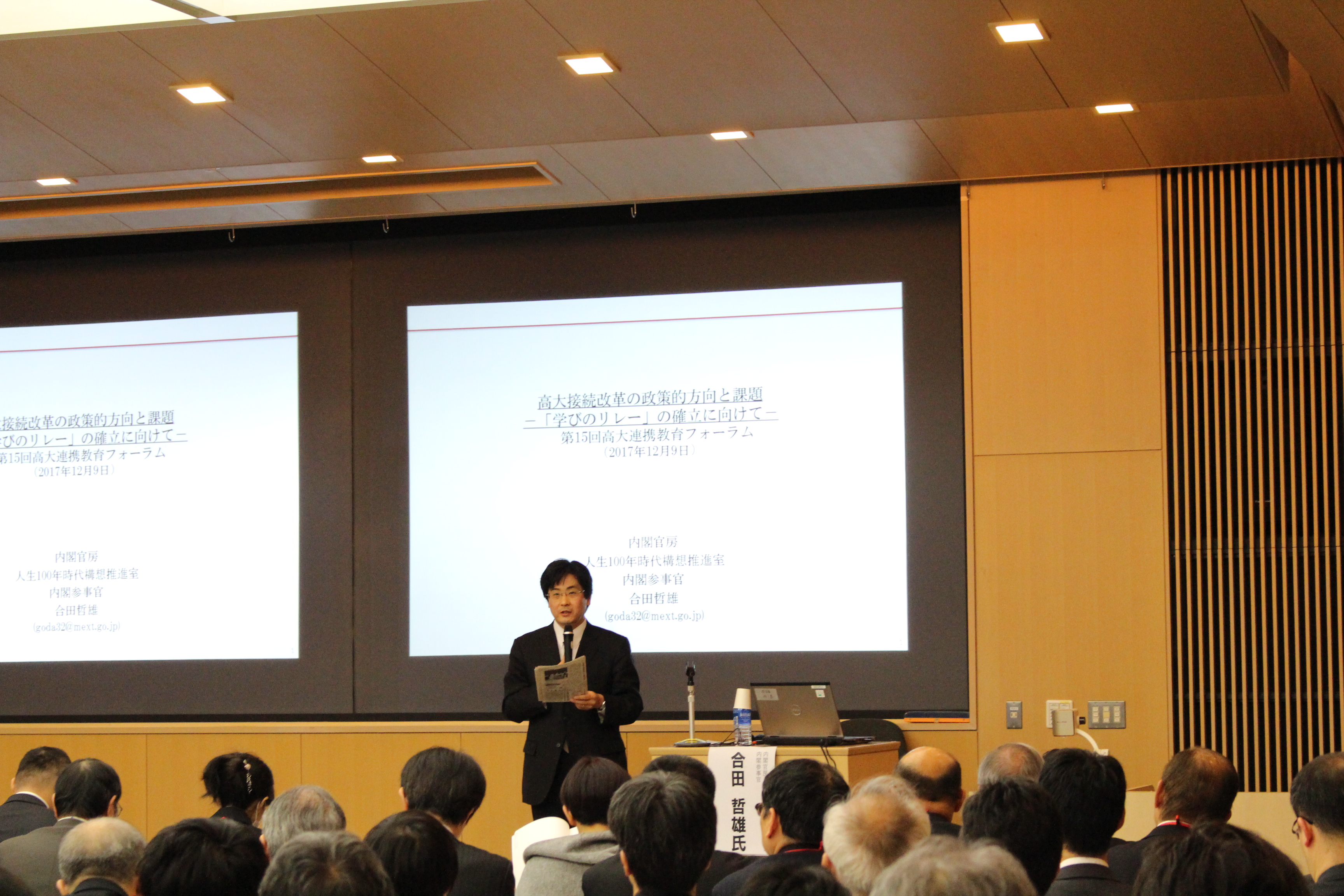
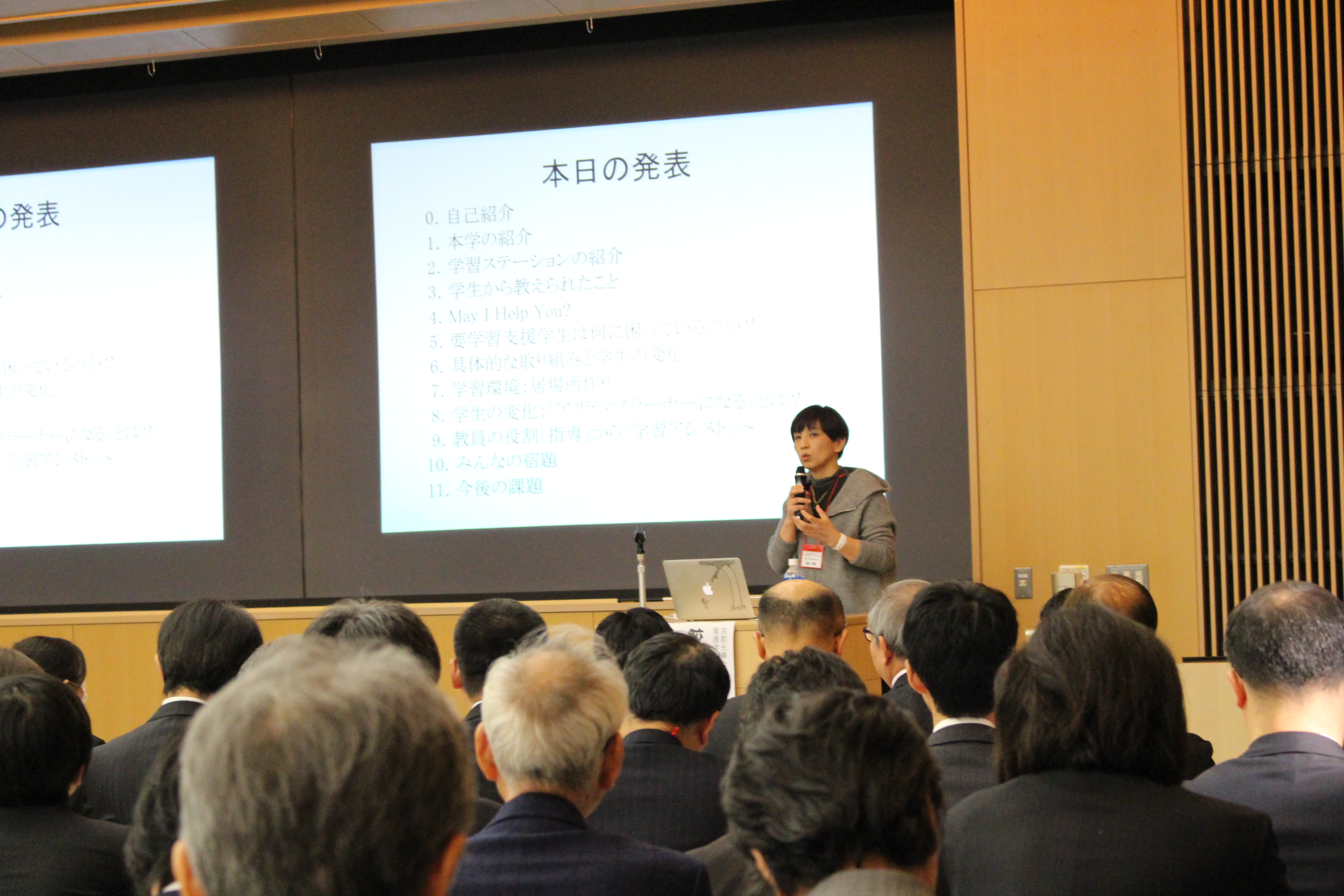
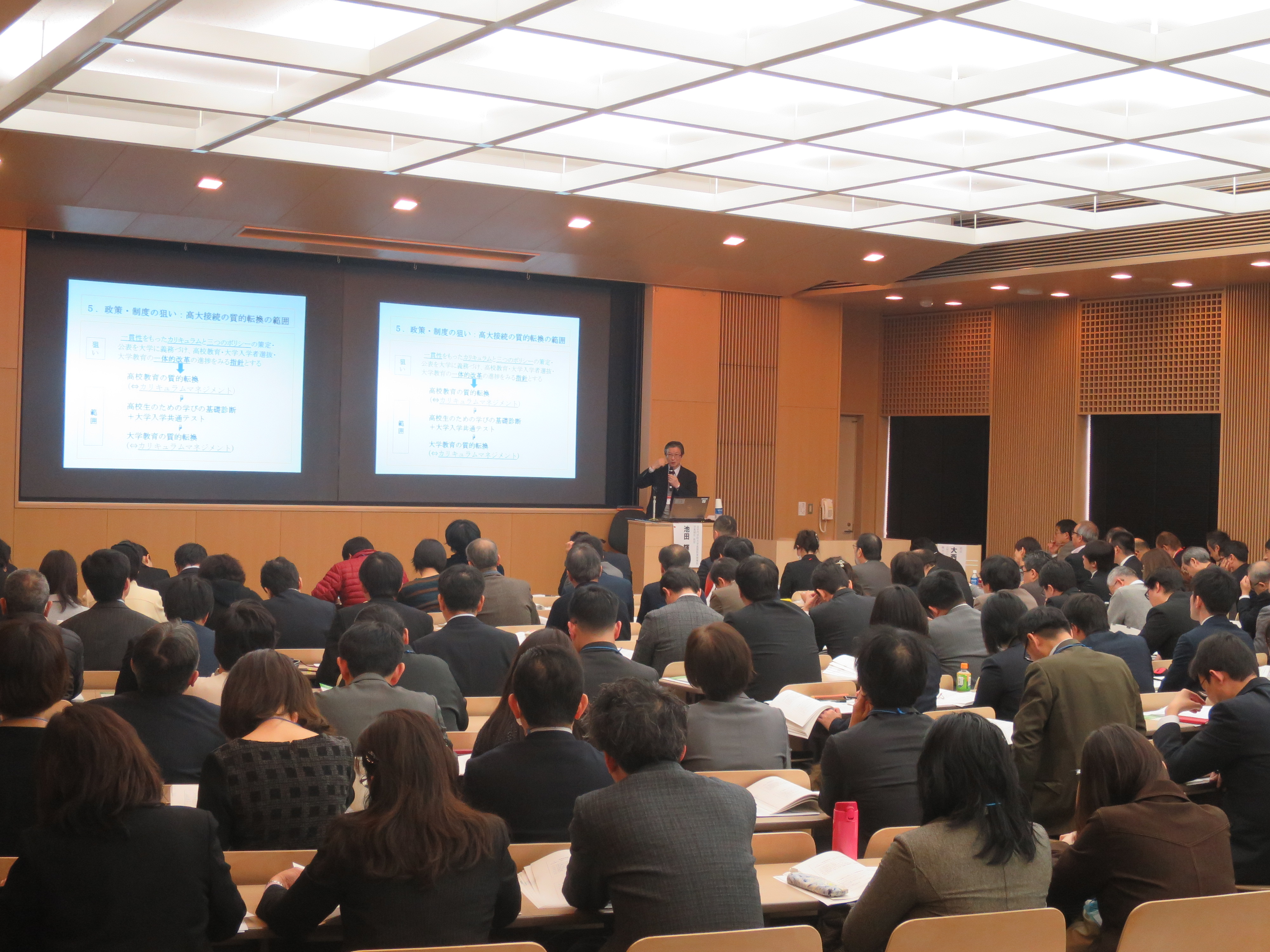
The main topic of the afternoon panel and floor discussion was “What skills should we develop now? The role of high schools and universities?” Participants were asked to discuss in groups, deepening their discussion by sharing their thoughts from both high school and university perspectives.
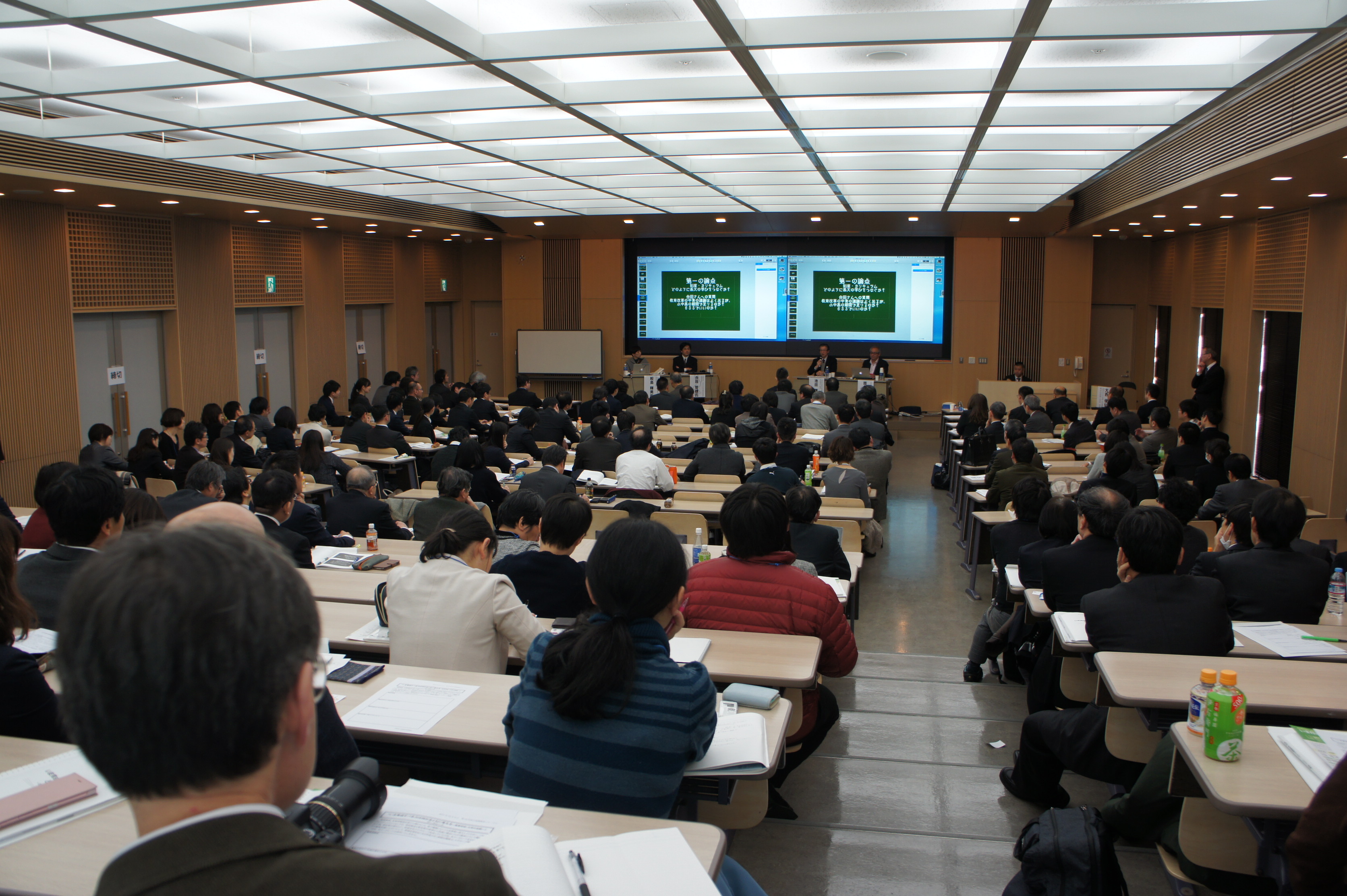
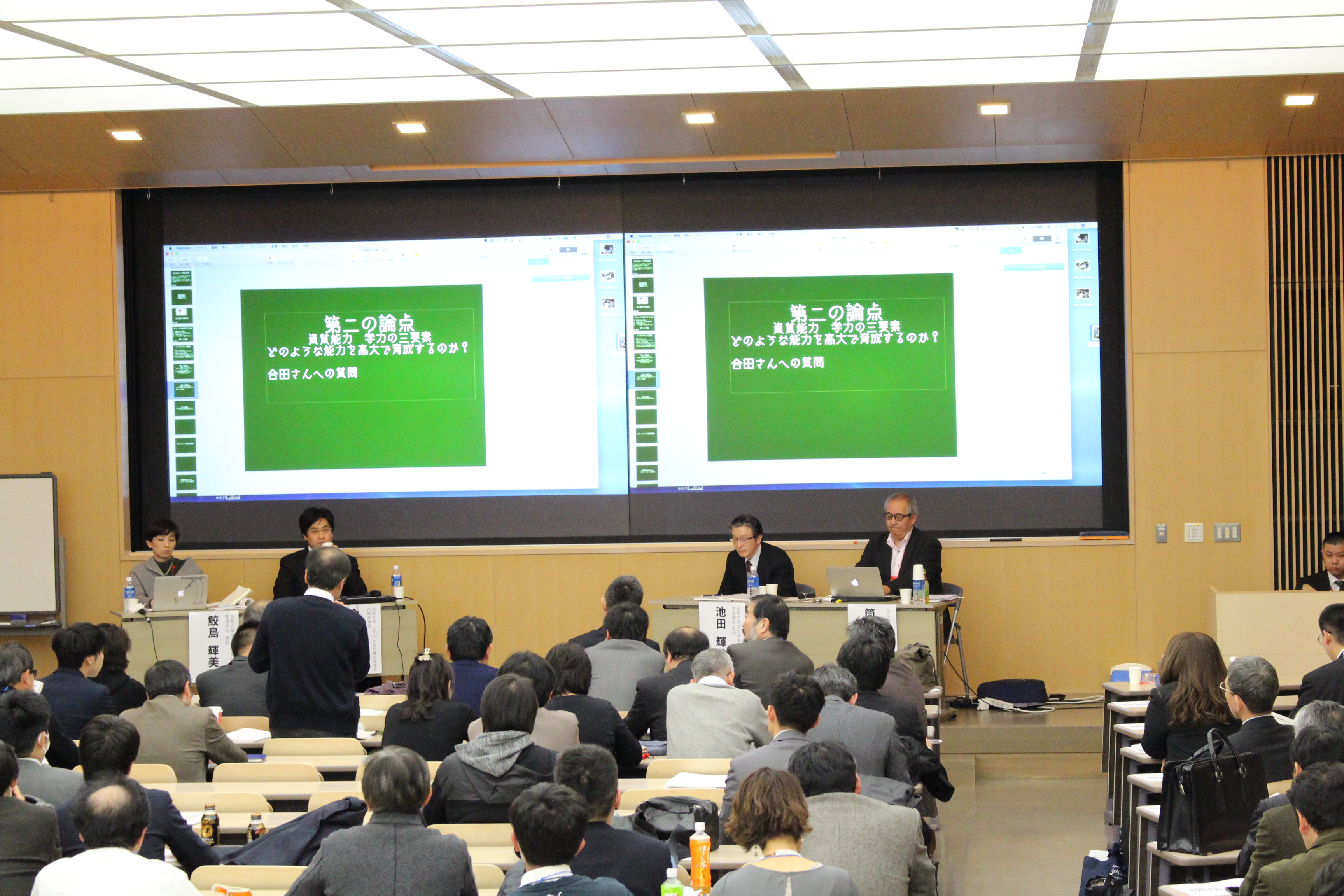
In the second part, the participants were divided into six subcommittees covering the following themes: presentation techniques, mathematics, English, science, training of admissions specialists, and high school-university-society collaborative career education. Information was shared and lively opinions were exchanged on each theme.
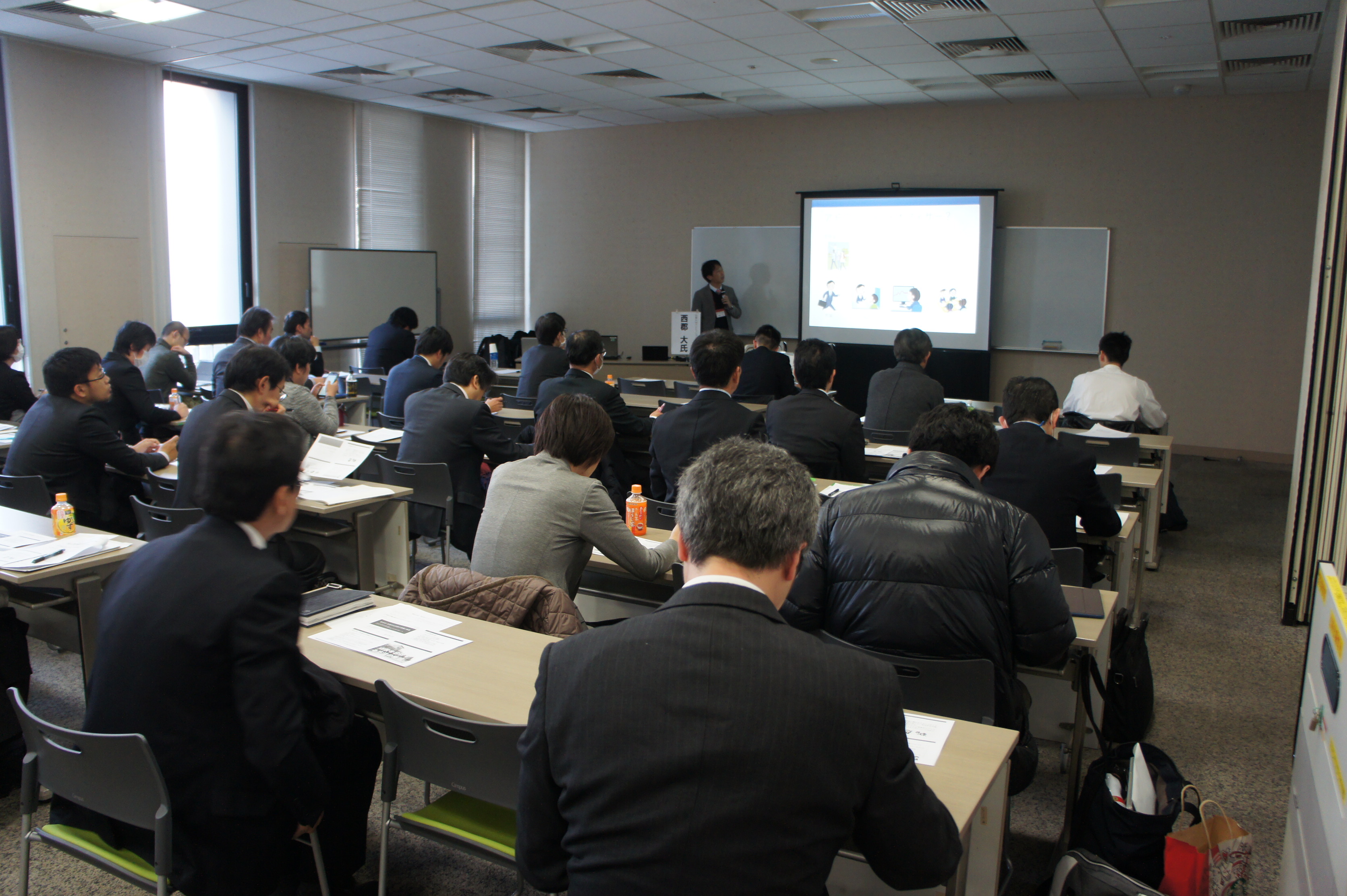
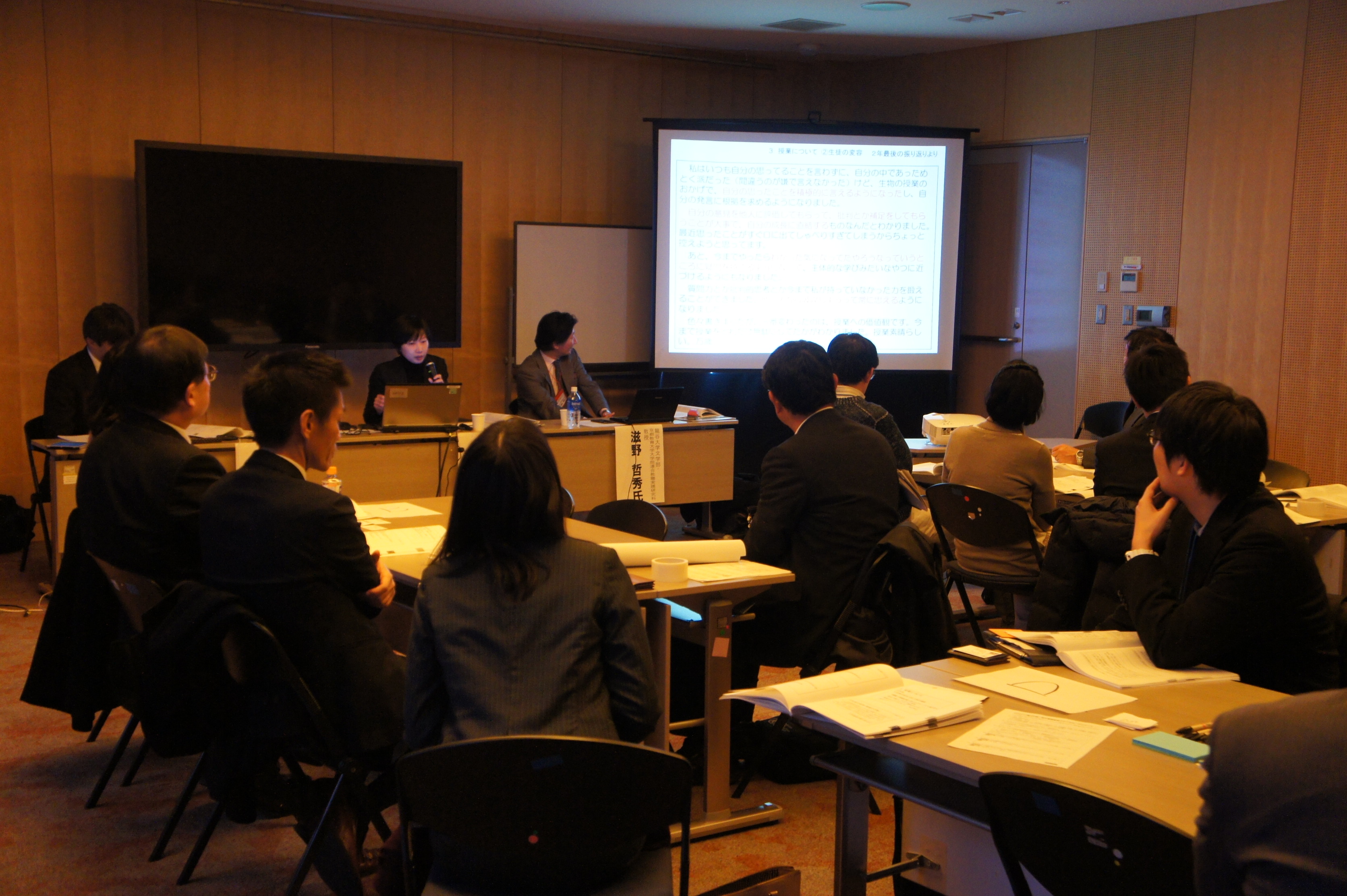
In the survey conducted after the event, participants responded with comments such as, “I would like to think again about what is in the students’ best interests when I provide instruction” (high school teacher), “It is difficult to take on new challenges, but I strongly felt that our teaching methods should change in line with changes in society” (high school teacher), and “I would like to re-examine my own teaching methods” (university faculty). It appears that participants had gained various realizations and learned something through the keynote speeches, case studies, panel discussions, and breakout sessions.
In addition, nine students, most of whom are aspiring to become teachers, volunteered to help run the forum. After the forum ended, they wrote a report about what they noticed throughout the forum and what they would like to use in the future. We would like to introduce some of the reports.
At the symposium, the lecturer asked everyone to take home as homework the question, “Is your classroom and class a place and relationship where you can feel comfortable saying ‘I don’t understand’?” This really made me think about it. Japanese students tend not to ask questions during class, but ask questions privately after class. I think this is because they are constantly worried that they will be laughed at by other students for asking irrelevant questions. In order to eliminate such anxiety among students, teachers must proactively create an atmosphere where students can actively ask questions, and for that reason, I felt that it is important to value interactions with students on a daily basis and build good relationships.
What I learned from this forum is that “lighting a fire in children’s hearts is a job that only humans can do.”
I was surprised again by the talk about the digital revolution in the lecture. It is true that with today’s incredible technological developments, it may be possible for AI to take the place of teachers. However, I learned once again that education is not just about making students memorize things, but about nurturing the minds of students and teachers growing together with them. During my teaching practice in my fourth year, I would like to explore my own ideas about what education should be like as I spend my days with students.
Contact Information
University Consortium Kyoto Forum for High School-University Collaboration Education, Public Interest Foundation
Tel: 075-353-9153 Fax: 075-353-9101 Address:
Campus Plaza Kyoto, Nishinotoin-dori Shiokoji-sagaru, Shimogyo-ku, Kyoto 600-8216
*Reception hours: Tuesday to Saturday 9:00-17:00 (excluding New Year holidays)














